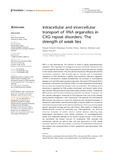Citation link:
http://dx.doi.org/10.25819/ubsi/10257Files in This Item:
| File | Description | Size | Format | |
|---|---|---|---|---|
| Intracellular_and_intercellular_transport_of_RNA_organelles.pdf | 2.65 MB | Adobe PDF |  View/Open |
| Dokument Type: | Article | metadata.dc.title: | Intracellular and intercellular transport of RNA organelles in CXG repeat disorders: The strength of weak ties | Authors: | Kailash Nabariya, Deepti Heinz, Annika Derksen, Sabrina Krauß, Sybille |
Institute: | Institut für Biologie | Free keywords: | RNA granules, Processing bodies (p-bodies; PB), CXG repeat disorders, RNA toxicity, Neurodegeneration, Stressgranula, Exosome | Dewey Decimal Classification: | 570 Biowissenschaften; Biologie | GHBS-Clases: | VOE VOH |
Issue Date: | 2022 | Publish Date: | 2023 | Source: | Frontiers in molecular biosciences ; 9, article number 1000932. - https://doi.org/10.3389/fmolb.2022.1000932 | Abstract: | RNA is a vital biomolecule, the function of which is tightly spatiotemporally regulated. RNA organelles are biological structures that either membrane-less or surrounded by membrane. They are produced by the all the cells and indulge in vital cellular mechanisms. They include the intracellular RNA granules and the extracellular exosomes. RNA granules play an essential role in intracellular regulation of RNA localization, stability and translation. Aberrant regulation of RNA is connected to disease development. For example, in microsatellite diseases such as CXG repeat expansion disorders, the mutant CXG repeat RNA’s localization and function are affected. RNA is not only transported intracellularly but can also be transported between cells via exosomes. The loading of the exosomes is regulated by RNA-protein complexes, and recent studies show that cytosolic RNA granules and exosomes share common content. Intracellular RNA granules and exosome loading may therefore be related. Exosomes can also transfer pathogenic molecules of CXG diseases from cell to cell, thereby driving disease progression. Both intracellular RNA granules and extracellular RNA vesicles may serve as a source for diagnostic and treatment strategies. In therapeutic approaches, pharmaceutical agents may be loaded into exosomes which then transport them to the desired cells/tissues. This is a promising target specific treatment strategy with few side effects. With respect to diagnostics, disease-specific content of exosomes, e.g., RNA-signatures, can serve as attractive biomarker of central nervous system diseases detecting early physiological disturbances, even before symptoms of neurodegeneration appear and irreparable damage to the nervous system occurs. In this review, we summarize the known function of cytoplasmic RNA granules and extracellular vesicles, as well as their role and dysfunction in CXG repeat expansion disorders. We also provide a summary of established protocols for the isolation and characterization of both cytoplasmic and extracellular RNA organelles. |
Description: | Finanziert aus dem Open-Access-Publikationsfonds der Universität Siegen für Zeitschriftenartikel |
DOI: | http://dx.doi.org/10.25819/ubsi/10257 | URN: | urn:nbn:de:hbz:467-24502 | URI: | https://dspace.ub.uni-siegen.de/handle/ubsi/2450 |
| Appears in Collections: | Geförderte Open-Access-Publikationen |
This item is protected by original copyright |
Page view(s)
401
checked on Apr 13, 2025
Download(s)
155
checked on Apr 13, 2025
Google ScholarTM
Check
Altmetric
Items in DSpace are protected by copyright, with all rights reserved, unless otherwise indicated.

